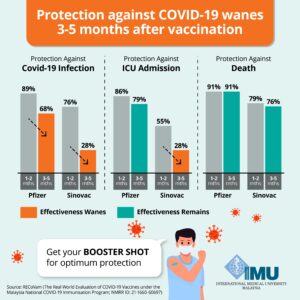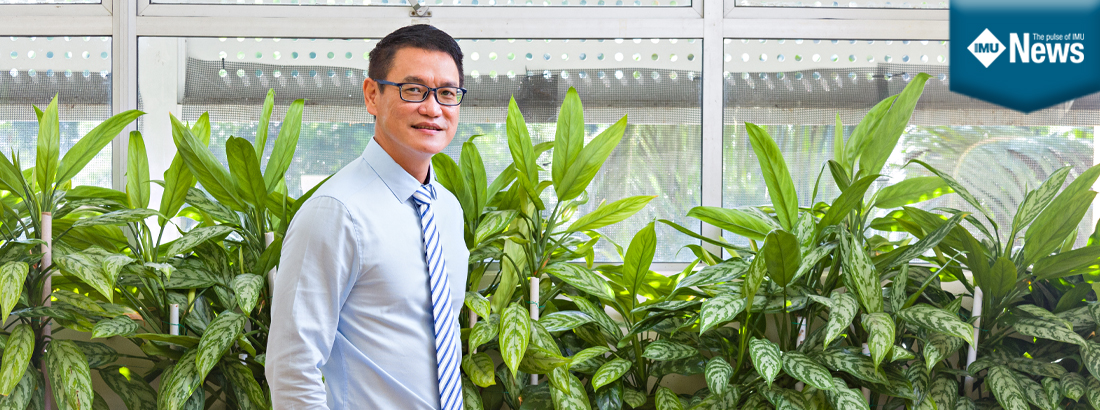As Malaysians enjoy the lifting of movement and business restrictions, it is also important that we enhance our protection from the COVID-19 virus with booster shots. However, there are still many questions that surround the issue. Prof Dr James Koh, Infectious Disease Consultant and Head, Division of Medicine, School of Medicine at the International Medical University (IMU) talks us through some of these questions to help boost our confidence.
Since the beginning of 2021, Malaysians have been lining up at vaccination centres to ensure that they get their primary vaccinations. While there was some hesitancy in the beginning, the take up of the vaccine soon ramped up and as of 10 December, the country has fully vaccinated 97.2% of its eligible adults (18 and above) as well as 86.8% of those aged 12 to 17.
But the fight against the virus continues and a few months after proudly displaying photos of ourselves getting our jabs, we are heading to clinics again – this time to get our booster shots.
Many health authorities had earlier assured us that boosters were not needed, so why the u-turn? “We are learning as we go along. Initially, it was thought that having two shots was enough. But research continues and with new data we now know that the protective effect (or neutralising antibody levels) for all vaccines tend to drop with time.
“That’s why the government and other authorities around the world are now proposing booster shots,” explains Prof James.
This should not come as a surprise, Prof James says, as most vaccines have boosters. For instance, the Hepatitis B vaccine has three doses – the second and third ones being boosters, Anti-Tetanus jabs should be boosted once every ten years and the pneumococcal vaccine that protects against pneumonia, once every five years.
“It’s not unique to the COVID-19 vaccine. We might not be familiar with vaccine boosters as Malaysians do not typically go for vaccinations,” explains Prof James, highlighting that although it is recommended that we get the influenza vaccine every year, very few do.
An urgent awakening
For Malaysians in particular, the need for boosters became urgent as the majority of our population, especially in the earlier phases, had taken Sinovac as their primary vaccination.
Local statistics from the Real-World Evaluation of Covid-19 Vaccines Under the Malaysia National Covid-19 Immunisation Programme (RECoVaM) show that Sinovac’s protection against COVID-19 infection fell from 76% in the first two months of being fully vaccinated to just 28% in months three to five. International studies corroborate this. “At three months, research shows that the neutralising antibody level in Sinovac was less than 50 per cent and at six months it was almost undetectable,” says Prof James.

For the Pfizer and AstraZeneca vaccines, lowered efficacy starts to show at six months. It is important therefore to get the booster shot which essentially reawakens our immunity systems to start producing antibodies.
“This booster shot is not the endgame. There will be a next booster and a next – we don’t know how many but we definitely know this will not be the last,” he says.
Mix-and-match
The safety of mixing vaccines has also brought about hesitancy. In early November 2021, the Center for Disease Control and Prevention (CDC) gave the green light to mix and match the different vaccines for our boosters. However, a statement in July by Soumya Swaminathan, Chief Scientist at the World Health Organisation (WHO) stating that data on mix-and-match was still unavailable, still circulates. For the record, she had later clarified that: “Individuals should not decide for themselves, public health agencies can, based on available data.”
And the available data has been growing.
| Evidence from countries that have been rolling out a mix-and-match system have shown good results. | |
|---|---|
| Singapore’s studies | A 72% reduction in infection risk when mixing the Pfizer primary vaccination with a Moderna booster as compared to 62% for those who used Pfizer for their first, second and booster shots. |
| Data from the Chilean Ministry of Health | The mix of a Sinovac primary vaccination with a booster of Pfizer resulted in a 95% effective rate against the virus. This was a big jump compared to using 3 doses of Sinovac, which showed a 74% effectiveness. |
However, Prof James encourages everyone to take their boosters no matter the mix as it is more dangerous to not take a booster. “It is better to get any booster than to have none at all. With Sinovac, it will just mean that you will probably need another booster sooner than later,” he says.
Are there those who should not take the booster? No, he says as anyone who was cleared to take the first two doses, is able to take the booster.
For those with diminished immunity such as those living with HIV/AIDS, those who had organ transplants or cancer patients, booster shots may actually be a fourth shot. “Some might have had to get three doses in the beginning in order to stimulate their immune systems to produce antibodies. For them, their booster shot would actually be the fourth jab that they get,” explains Prof James, adding that boosters are also perfectly safe in such cases.
Emerging change
The landscape continues to change with new variants such as the Omicron emerging. “There’s still much to be known about the new strain. Preliminary findings suggests the Omicron variant is five times more transmissible than the original virus, while the Delta was twice as transmissible as the original. “That means with the Delta, one infected person can infect two persons, while with the Omicron, one infected person can infect five persons,” Prof James says.
Omicron is also three times higher in terms of reinfection – that means you can get it again and again. However, so far the data shows that symptoms are mild among adults while children are experiencing heavier symptoms. “This could be because young children below 12 are not vaccinated yet,” Prof James says.
The silver lining is that the death rate hasn’t gone up yet although it will only be closer to the end of the year before there is enough data to make any conclusions. Some promising news is that Pfizer and BioNTech have just released a statement that 3 doses of the Pfizer vaccine still provides protection against Omicron in terms of developing severe disease.
To boost or not to boost?
As Prof James says, “Vaccines will continue to be updated. Even if you do not take a booster now, you will still need to have one in the future. In the meantime, the current boosters are still effective.”
To boost or not to boost? Make the right choice.
| In the News | Online Copy | Printed Copy |
|---|---|---|
| New Straits TImes, 7 January 2022 | To boost or not to boost? – get the facts | – |
| Malaysian Reserve, 7 January 2022 | Boosting confidence | Boosting confidence |
| i3investor.com, 7 January 2022 | To boost or not to boost? – get the facts | – |
| Daily Straits.com, 6 January 2022 | Boosting Confidence | – |









